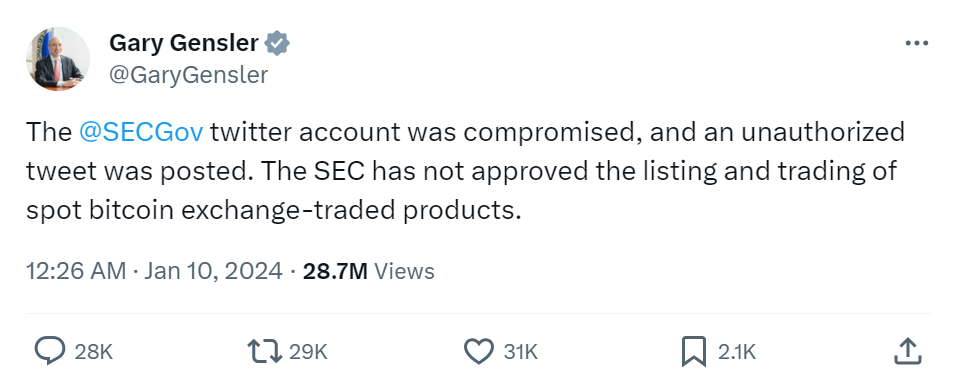On January 10, the official US SEC account on X fell victim to a cyber attack, rekindling concerns about the platform’s security. Hackers exploited the SEC account, spreading false information about an imminent statement regarding cryptocurrency. A misleading tweet suggested that exchange-traded funds now held Bitcoin, leading to a price surge and widespread apprehension. The SEC swiftly removed the tweet, attributing the breach to an unknown third party who gained access to the associated phone number.

Later, X revealed that the hack occurred because two-factor authentication was not in place during the incident. Despite the platform’s assurances that the breach did not originate from its servers, security experts expressed concerns about potential disinformation threats. The SEC confirmed collaboration with law enforcement and other government entities to investigate the cyber attack. The agency promptly terminated the “unauthorized access” to its account, emphasizing the seriousness of the incident.
However, crypto enthusiasts and private investigators are sure that this was done in order to manipulate the prices — such attack prompted Bitcoin prices to reach almost $48,000 before falling to below $46,000 once the compromise was announced. Rumors say that the hackers behind the attack were engaged in marginal trading, entering long positions right before the fake tweet, and consequently making short bids right after.
The U.S. Securities and Exchange Commission’s Office of Inspector General has been urged by Senators Ron Wyden,
“The SEC’s failure to follow cybersecurity best practices is inexcusable, particularly given the agencys new requirements for cybersecurity disclosure. Additionally, a hack resulting in the publication of material information for investors could have significant impacts on the stability of the financial system and trust in public markets, including potential market manipulation,” wrote Wyden and Lummis in a letter to SEC Inspector General Deborah Jeffrey.
A day after the hack, the SEC approved the long-awaited Bitcoin ETFs. Because the ETF structure provides financial advisers and institutions with a familiar and regulated means to purchase exposure to Bitcoin, the final approval appeared to be a watershed moment in the mainstream use of cryptocurrencies.
Meanwhile, according to Gary Gensler, many law enforcement agencies are currently working on the matter.
“Staff are coordinating with appropriate law enforcement and federal oversight entities, including the SEC’s Office of Inspector General, the Federal Bureau of Investigation, and the Department of Homeland Security’s Cybersecurity and Infrastructure Security Agency, amongst others, in their investigations. The agency will provide updates on the incident as appropriate.”
FUD: Bitcoin Is Volatile Amid ETF Speculation
The impending decision by the SEC regarding BTC Spot ETFs contributed to market instability. Increased centralized exchange trading volumes and daily spot volume indicated heightened interest and speculation surrounding the ETF approval.
Numerous enterprises have submitted requests for exchange-traded funds (ETFs) historically, only to see them retracted, and the regulator has been opposed to a so-called spot bitcoin fund for an extended period. Beneath his leadership, SEC Chair Gary Gensler has voiced opposition to digital currencies.
After succumbing to Grayscale in a legal ruling challenging the SEC’s prohibition of bitcoin ETFs but approval of funds tracking bitcoin futures, the regulator appeared to shift its stance on the ETF matter in 2023.
The current action by the Commission focuses solely on ETPs that possess bitcoin, a non-security commodity. However, this does not suggest the Commission is prepared to embrace criteria for listing crypto asset securities. Gensler clarified in a statement that the approval does not signify the Commission’s position on the regulatory handling of other cryptocurrency assets or the extent to which certain participants in this domain might be breaching federal securities laws.
Hopes for endorsement were reignited earlier this year following BlackRock’s massive June proposal, triggering a flood of analogous petitions from rivals. Many industry experts anticipated the authorization of the inaugural bitcoin ETFs shortly after the onset of 2024, courtesy of the collaboration between Ark Invest and 21Shares, holding the lengthiest active file and a January deadline for the SEC on the fund.
In a sector poised to be fiercely competitive, over a dozen companies are already in the official launch process, each armed with its distinct expense ratio and promotional approach. Numerous entities have scaled down the initial proposed charges. The entry of a fund into the market hinges on the application’s status. According to the Cboe website, several bitcoin exchange-traded funds (ETFs) were anticipated to commence trading on the BZX market.
Despite excitement over the possible ETF approval, analysts, including Bloomberg Intelligence’s Mike McGlone, warned that the launch could signal a near-term peak for the Bitcoin market. Concerns about risk assets and potential market corrections were emphasized.
In summary, hacking into the SEC account on X has reignited discussions about the platform’s security. At the same time, concurrent market developments, including Cramer’s warning and ETF speculation, have driven significant price movements in the cryptocurrency space.
 cryptonews.net
cryptonews.net
